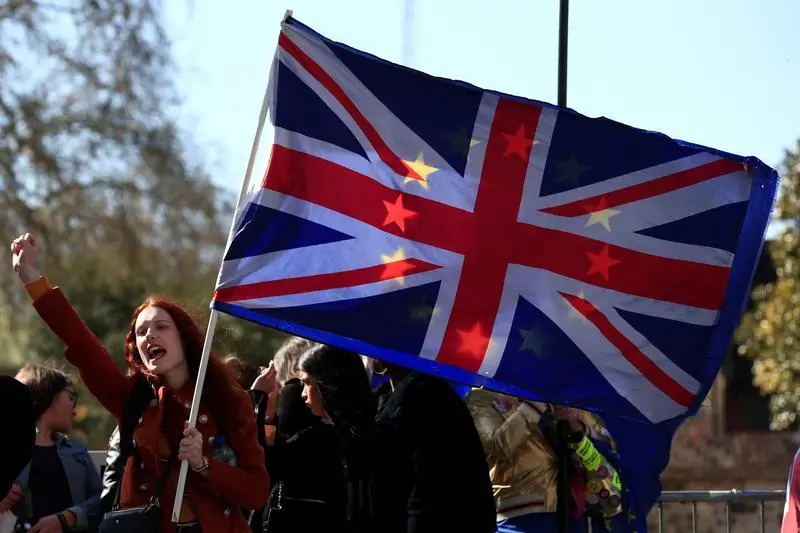PHOTO
LONDON - For Boris Johnson, Brexit is a monumental problem. Britain is set to leave the European Union on Oct. 31, but the country’s new prime minister has still not found a good way to get it done. Parliament repeatedly rejected his predecessor Theresa May’s departure deal, and a majority of lawmakers seem to be against the default alternative of leaving without an agreement. Johnson wants to force through the departure, with or without any deal.
He may yet get his way. The BBC reported on Wednesday morning that the government plans to suspend parliament until Oct.14, limiting opponents’ time to come up with a workable alternative. Whatever happens, however, Britain’s European problem will remain. Three years and two prime ministers after the Leave campaign narrowly won a vaguely worded referendum, the United Kingdom is as far as ever from a national consensus.
The only really good solution requires a time machine to go back and cancel the referendum before it was called. Back in the real world there are only more or less bad ways forward. As May proved, compromise is unpopular with both sides. Another referendum would be unlikely to settle the debate. The least bad approach is for the UK to stay in the EU by revoking its notice of departure. The advantages are multi-dimensional.
For the economy, it’s not even complicated. There has never been a good economic reason to leave, while there are many for staying in. Europe’s single market brings British businesses more potential customers and more potential workers than they could access from outside the bloc. It also allows for more efficient manufacturing, research and marketing.
Economic scale also brings clout in setting global technical standards, negotiating trade agreements and putting political and economic pressure on other nations. While the United States has the world’s largest economic output, the EU’s 28 members collectively produce about 90% as much. The UK economy, by contrast, is a relatively puny 15% of America’s.
The only economic question about Brexit is how much damage it will cause and how long it will last. The greatest harm will be caused by leaving without a deal, which could be more accurately described as FDNPW Brexit - Future Deals Negotiated from a Position of Weakness.
The social case in favour of leaving the EU might be stronger than the economic one, but it is still hard to understand the supposed benefits. One hope seems to be that Britain will become more British after it has left the European club.
That will not happen. Brexit will have no effect on the 5.7 million British residents who were born in a non-EU country, or on their families. As for the 3.7 million British residents who were born in another EU country, equivalent to 5.7% of the total population, most of them are already citizens or approved long-term residents. The vast majority will presumably stay.
Then there is the hope that leaving the EU will allow the nation to reclaim some lost sovereignty. This literal flag-waving is probably the most emotionally resonant argument in favour of Brexit.
The reality is far murkier, though. Sovereignty is never absolute, because nations are always constrained by international agreements and economic and political pressure from neighbours and rivals. Membership of the EU arguably enhances the UK’s genuine sovereignty, by helping the country resist pressure from the likes of China and the United States, at the expense of pooling decision-making with Germany and France. Besides, EU rules impose relatively few practical limits on British practices.
Even if there are gains in national self-determination, they would likely come with losses in global influence. Much of the 94% of the world’s population which does not live in Europe respects and fears the continent. Feelings about its faded former leading colonial power are more mixed.
The domestic political case for some sort of exit is relatively strong, though, and is reinforced by the result of the referendum. Even some British EU-enthusiasts now think that departure is needed to avoid undermining faith in democracy. The concern is legitimate, but there are two serious counterweights.
First, no appeasement is likely to work. The anger of the most virulent supporters of leaving the EU is too unconnected with the realities of membership to be assuaged by any variety of departure. On the contrary, the economic woes and continuing negotiations which will follow an actual exit are likely to bring even more anger.
Second, departure will breed a new source of discontent, from supporters of staying in. Some of the near-majority of voters in the 2016 referendum, not to mention those who have reached voting age since, will be deeply unhappy with a government which has ignored their views and worsened their futures.
British commentators and politicians generally reject “revoke and remain” as an unrealistic option. That view is backwards. What is unrealistic is the belief that there is some sensible way to leave the EU. Three years after the referendum, no Brexit remains the most realistic policy choice.
(Editing by Peter Thal Larsen and Karen Kwok) ((edward.hadas@thomsonreuters.com; Reuters Messaging: edward.hadas.thomsonreuters.com@reuters.net))





















